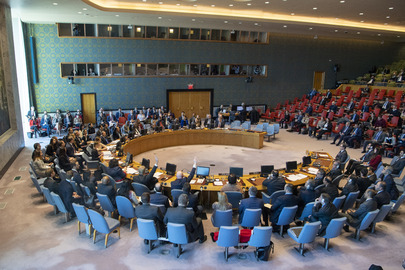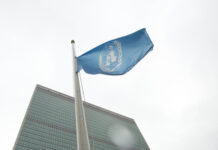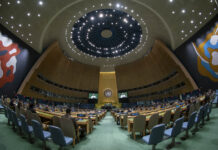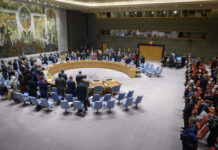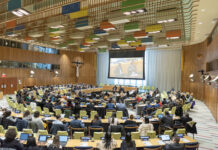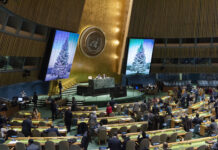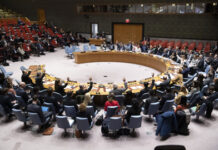This is the News in Brief from the United Nations.
‘Humanitarian disaster zone’: Gaza hospital capacity decimated – WHO
The last barely functioning hospital in northern Gaza is a “humanitarian disaster zone”, the UN World Health Organization (WHO) said on Tuesday, highlighting the disastrous consequences of ongoing Israeli bombardment for critically ill and injured civilians across the enclave.
Briefing reporters from Gaza, Dr. Richard Peeperkorn, WHO’s representative in the Occupied Palestinian Territory, described corridors overflowing with trauma patients at Al-Ahli Hospital in Gaza City, where fuel, oxygen, food and water are scarce.
“I’ve never seen scenes like this in my life. The doctors are really forced to prioritize who receives care and who doesn’t, and they’re treating many of the serious cases in the corridors or on the floor.”
In just 66 days of fighting, the Strip has been transformed from a “reasonably functioning health system” producing health indicators “on par with neighbouring countries” to a situation where more than two thirds of its 36 hospitals and over 70 per cent of primary healthcare facilities are out of commission, Dr. Peeperkorn said.
Last Saturday a WHO-led UN and Palestine Red Crescent Society (PRCS) convoy encountered “serious incidents” during a mission to deliver trauma and surgical supplies for 1,500 patients to the hospital and evacuate 19 critical patients and their companions to the south, the UN health agency said.
The convoy was stopped twice at a checkpoint and medical staff were detained, causing delays. One of the injured patients reportedly died as a result of his untreated wounds.
Invest in primary healthcare, save lives: Tedros
Staying with health: half of the world’s population is not fully covered by essential health services and two billion people are impoverished because they must cover medical bills out-of-pocket.
WHO warned on Universal Health Coverage Day – observed on Tuesday – that without urgent action, “these gaps will only widen”.
Health agency chief Tedros Adhanom Ghebreyesus stressed that investing in resilient health systems, based on strong primary healthcare, is “the most inclusive, equitable and cost-effective path towards universal health coverage”, defined as a situation where all people can access the health services they need, without financial hardship.
Health systems that can respond to shocks, such as the fast-advancing climate emergency, can avert millions of additional deaths each year, WHO insisted.
In a political declaration last September world leaders committed to redouble their efforts to achieve universal health coverage by 2030.
WHO said that it is working with countries to reorient health systems towards a primary healthcare approach “that can help deliver 90 per cent of essential health services while saving 60 million lives by 2030”.
Record hunger in West and Central Africa: UN humanitarians
Food insecurity has continued to worsen in West and Central Africa with the number of hungry people set to reach a “staggering 49.5 million” by the middle of next year, UN humanitarians said on Tuesday.
“Acute hunger remains at record levels in the region, yet funding needed to respond is not keeping a pace”, UN World Food Programme (WFP) regional director Margot Vandervelden said, stressing that for lack of funds WFP has been forced to scale back lifesaving assistance for those in need.
Acute hunger in West and Central Africa is mainly driven by conflict which has driven millions out of their homes and farms, along with the climate crisis and high food and fuel prices.
More than two in three households cannot afford healthy diets the cost of which in countries like Burkina Faso, Mali and Niger is 110 per cent higher than the daily minimum wage.
Four in five of the region’s youngest children do not consume the minimum number of food groups they need for optimal growth and development, WFP warned, together with the UN Children’s Fund (UNICEF) and the Food and Agriculture Organization (FAO).
In the first ten months of 2023, 1.9 million children under five were admitted for treatment due to severe wasting across nine Sahel countries, representing a 20 per cent increase from last year.
Dominika Tomaszewska-Mortimer, UN News.
Source of original article: United Nations (news.un.org). Photo credit: UN. The content of this article does not necessarily reflect the views or opinion of Global Diaspora News (www.globaldiasporanews.com).
To submit your press release: (https://www.globaldiasporanews.com/pr).
To advertise on Global Diaspora News: (www.globaldiasporanews.com/ads).
Sign up to Global Diaspora News newsletter (https://www.globaldiasporanews.com/newsletter/) to start receiving updates and opportunities directly in your email inbox for free.


